10 Dangers of Having an Impaired Gut
If you have a fecal impaction, at some point along the line your digestive tract developed something called a functional bowel disorder. This disorder takes away your gut’s ability to move stools along until it eventually comes to a crippling halt. Till recently, it was believed that this disorder only posed a serious threat when your stools got completely stuck. However, new clinical evidence suggests that
even the early slowdown of your digestive tract can pose many dangers to your wellbeing.
In other words, even mild constipation, where your stools are still slowly moving, is now considered a warning sign of a more serious, long-term problem that could be already affecting your health.
Emerging research now indicates that an impaired gut can dramatically affect many aspects of your life…
- It can control how you feel emotionally all day
- I can regulate your thinking and lower your cognitive abilities
- It can change how you look in such a noticeable way that others can notice
- It can shape your behavior and how you act
- It can affect how fast you’re aging at a cellular level
- It can even determine how long you will live regardless of your genetic predisposition
All this happens without you ever realizing that it’s been a hidden bowel disorder relentlessly damaging your gut and influencing every facet of your existence.
Let’s go ahead and look at the 10 recently discovered dangers of having an impaired gut so that you can recognize them early and take back control of all the affected parts of your life…
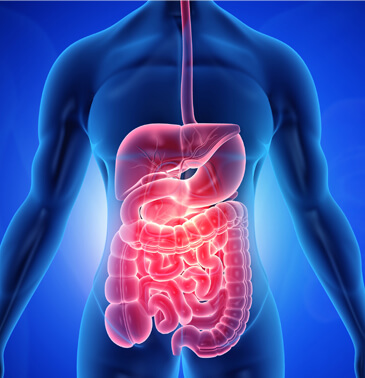
An impaired digestive tract can lower your overall life expectancy
While we’ve always known that aging affects our digestive tract, only recently have we begun to learn that our digestive tract can affect the aging process in-return.
Research has revealed that countries with the highest life expectancies (for ex. Japan) have populations with better gastrointestinal functions. A large part of this is because of something known as “reserve capacity”, which is how much your digestive function can decline without any negative effects to your health.
People with an optimally working digestive system have ample reserve capacities to take on age-related declines. However, the gut of fecal impaction sufferers stays in such a persistently unhealthy state that they use up their reserve capacity early on. This adds to the eventual decline of their colon function and has a marked effect on your expected lifespan.
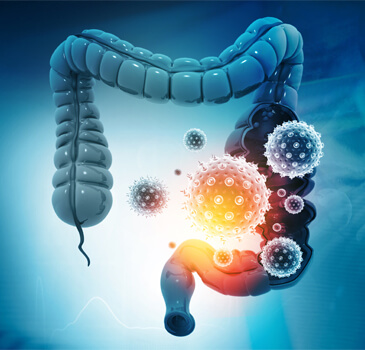
Having an unhealthy gut prematurely ages you
Recent evidence suggests that your gut microbiome is a very accurate “aging clock” that can be a reliable predictor of your true physiological age.
Research even shows that people who have unchanging microbiomes tend to die earlier than people that have dynamic a bacterial composition in their gut.
Unfortunately, the gut of fecal impaction sufferers not only has an unhealthy bacterial balance, their bowels also tend to maintain low-diversity microbiomes. This reduction in bacterial species diversity makes your existing gut microbiota less resistant to fluctuations caused by environmental factors.
This takes away your ability to readily adapt to health challenges and accelerates your body’s overall aging process in the long run.
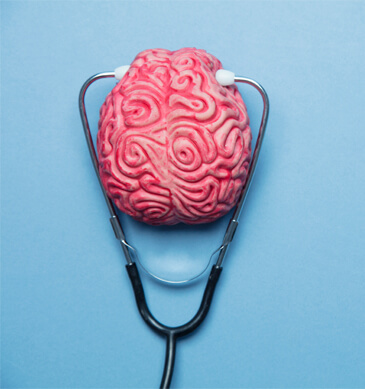
You are more likely to suffer from emotional and mental health issues
Our brain uses a very intricate communication system to interact with our gut. However, we’re now discovering that this communication goes the other way around as well where our digestive tract influences how our brain functions.
This bi-directional communication system is known as the gut-brain axis and it has a massive impact on how you feel and how you act.
This connection between our gut and brain is so strong that psychiatric drugs have shown to effectively treat bowel disorders and now we’re even finding out that many mental health disorders can in-turn be treated by improving your gut health.
This has huge implications if you are a fecal impaction sufferer because the poor condition of your gut can significantly increase your chances of developing anxiety, depression and chronic stress. In fact, research even shows that simply suffering from constipation can also lower the quality of your everyday life by affecting your mood, behavior and even your relationships.
In other words, how you’re feeling right this moment and how you behave with others is presently being influenced by the current state of your ailing digestive tract.
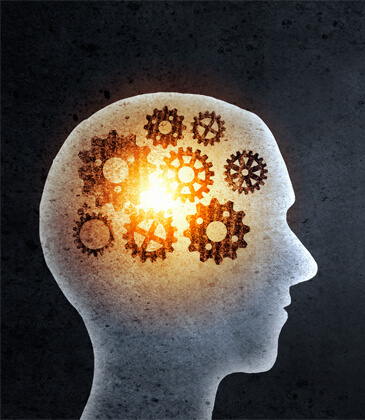
Your thinking abilities are likely to decline
There are two thin layers of over 100 million nerve cells that line our entire digestive tract. Scientists call this the Enteric Nervous System (ENS), in other words the nervous system of the intestines. This nervous system acts as our second brain and has a significant influence over our Central Nervous System (CNS).
The bacteria in our digestive tract uses this influence to control our cognitive abilities to a great extent.
Since the slow fecal transit during fecal impaction and constipation results in poor gut microbiomes, your enteric nervous system’s signaling to your brain starts affecting your memory, attention and learning abilities.
You may not even notice this happening but it can have a very real impact on your everyday life.
Even worse, new evidence shows that an impaired gut can compound age-related neurological issues and increase your risk of developing Alzheimer’s and Parkinson’s disease. This often results in much poorer outcomes as can be seen with the high mortality rates in fecal impaction patients with dementia.

You will experience greater muscle loss as you get older
One of the most disabling aspects of aging is the progressive loss of muscle which starts from the time we turn 30. This is known as sarcopenia and we’ve recently learned that our gut plays a major role in its pathology.
We’ve discovered the reason why most people get frail with old age may have to do with ongoing, low-grade inflammation. Researchers have found that changes in our gut bacteria may be the driving factor behind this process.
Fecal impaction sufferers are especially prone to this issue because your digestive tract stays in a constant state of inflammation and the prolonged presence of stools in your gut encourages the growth of inflammation-promoting unhealthy bacteria.
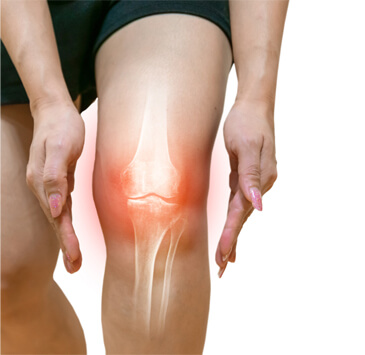
You will also experience greater bone loss as you age
Our bodies are only able to increase bone density until the age of 25, after which we gradually lose bone mass with each passing year. This bone loss speeds up significantly when we cross 50 and it is the second leading cause of unintentional injury deaths worldwide…
This goes to show how bone loss related issues are not only very common but also deadly. It also highlights how important it is for us to maintain our bone density as time goes by.
Clinical studies have now revealed that microbes in our gut play a vital role in supporting our bone strength by inhibiting osteoclasts (cells that degrade bone) and promoting the proliferation of osteoblasts (cells that form bone).
An impaired gut however, often lacks the rich microbiota necessary to encourage bone mass retention. As a matter of fact, the inflammation that is commonly seen in the gut of constipation and fecal impaction sufferers has not just shown to negatively affect bone metabolism, it is also frequently associated with osteoporosis.
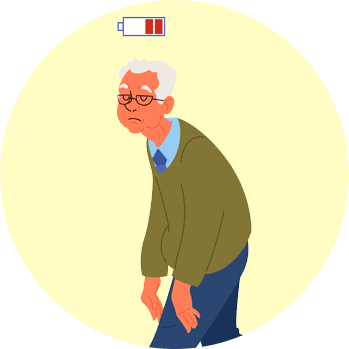
You will have chronically poor energy levels
From the time you wake up to the time you go back to sleep, how much energy you have can determine how productive you are, how excitedly you engage with your day and even your overall satisfaction with your life.
While our diet is a significant factor in contributing to our overall energy balance, our gut is assigned the crucial task of absorbing nutrients from our food and distributing it to our body to be turned into cellular fuel.
One critical process by which our intestines affect our energy levels is by using our gut bacteria to ferment dietary fibers and producing something called SCFAs (short-chain fatty acids) which are known to be extremely important in controlling our energy metabolism.
Studies have shown that gut dysbiosis (poor bacteria composition) is not only a hallmark of slow moving stools, it also saps you of your energy levels by lowering the SCFA levels in your digestive tract. This is why people that suffer from chronic constipation report feeling tired all the time and often struggle to power through their day.

It affects how you look and how others perceive you
Both our gut and our skin have microbiomes that communicate with each other through something known as the gut-skin axis.
This communication system allows the health of our gut to determine how our skin appears and how it ages in such a distinct way that others are able to quickly infer our overall health based on these visual cues.
In fact, people’s perception of us can even go beyond how our skin looks and also be guided by how our skin smells. Evidence shows that people with healthier digestive microbiota and are rated higher on an attractiveness scale because their immune system function is projected through their body odor.
It is remarkable how sensitive we are to such subtle signals and how our gut can change how others interact with us. Unfortunately, this also means people with impaired digestive tracts likely project unhealthy health cues to others and this can come to play a significant role in your social, work and love life.

You are likely to have poor quality of sleep
How well you sleep at night doesn’t just determine how well you function the next day, it has shown to determine your risk of developing many chronic diseases such as heart disease, diabetes, obesity, stroke and cancer.
New research has now revealed that not only does our gut microbiome influence the quality of sleep we get, poor quality of sleep can in-turn degrade your digestive tract’s bacterial composition. This can lead to a vicious cycle where your gut becomes progressively unhealthier and your sleep gets progressively worse.
Indeed, studies have shown that the worse your constipation, the worse your sleep disturbances. This has major consequences for fecal impaction sufferers because your digestive tract is in such an extreme state of disrepair that your chances of developing a secondary chronic condition becomes very high.

You are likely to have poor immune function and impaired healing
Our capacity to fight diseases and our ability to maintain our youth to a large extent is determined by our immune function and how well we heal from injuries. Clinical evidence suggests that both these things are affected by the health of our gut.
Research indicates that gut dysbiosis can cause immune dysregulation and affect our overall healing, not just in our digestive tract but other parts of your body as well.
Once your immune system’s function goes off balance, it can lead to further gut impairment, trapping you in a downward spiral of worsening immune system and digestive function.
Since 70% of our immune system resides in our gut, by the time you develop chronic constipation or fecal impaction, your immunity is so affected that it starts to age your body faster and you become vulnerable to infections, autoimmune diseases and even cancer.
An impaired gut also contributes to all the top 10 causes of death from disease in humans

Heart Disease
Research shows that our gut microbiome significantly influences all major causes of cardiovascular disease including atherosclerosis, lipid metabolism and hypertension.

Cancer
Evidence also suggests that microbial metabolites in our gut can promote tumorigenesis and trigger inflammation (an important risk factor for many types of cancer).

Chronic Lower Respiratory Diseases
Alterations in our gut microbiota and their metabolites have been linked to immune system changes and inflammation that have shown to promote lung diseases such as asthma and COPD.

Strokes
Disruptions in anerobic gut bacteria have recently been shown to play an important role in the cascade of events that lead to both ischemic and hemorrhagic strokes and even post-stroke infections.

Alzheimer’s Disease
Gut dysbiosis has shown to promote the development of Alzheimer’s disease through multiple pathways such as increasing permeability of the blood-brain barrier and the secretion of large amounts of amyloids.

Diabetes
Evidence suggests that even a moderate degree of gut dysbiosis can promote type II diabetes by decreasing butyrate production and reducing your ability to resist oxidative stress.

Pneumonia/Influenza
Microbiota in our upper respiratory tract and gut work together to prevent the colonization of pathogenic bacteria in the lungs and by regulating our immune response. Loss of this gut-microbiome mediated protection has shown to increase your likelihood of developing many types of influenza including the seasonal flu, swine flu (H1N1) and avian flu (H5N1).

Kidney Disease
The gut of chronic kidney (CKD) disease patients is known to be in a state of inflammation with endotoxins constantly leaking into the bloodstream. The increase in gut derived toxins can also further accelerate the decline of your kidney function through renal injury.

Chronic Liver Disease
Similarly, patients with cirrhosis often develop gut dysbiosis, bacterial overgrowth in the small intestine and increased gut permeability which causes endotoxins to enter the liver via the portal vein, leading to damaging liver inflammation.

Parkinson’s Disease
It is well established that PD patients often have comorbid GI dysfunction with around 80% of patients suffering from constipation. However, we also now have strong evidence that gut microbiome disorder can increase the deposition of α-synuclein during PD, worsening the neurodegeneration.
It is truly incredible how far an ailing gut’s threat can extend into your life and yet still go unnoticed as the primary cause of so many health problems we eventually develop. What’s especially worrying is that if you are a fecal impaction sufferer, your gut is already in a state of extreme disrepair and many of these harmful effects are already underway in your body
This is why it is so crucial to not just take immediate action and treat your fecal impaction; it is also critical that you choose a treatment option that effectively reverses your gut impairment. So, next
let’s take a look at all of the top fecal impaction and constipation treatments to see how they work and how they compare to each other.



